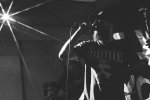Bailterspace - Strobosphere Album Review
 With embarrassment I admit that until today I had referred to the band in prolonged hipster conversations about music as “Baiterspace.” The word was an earworm at one point, the kind of word that circles around in your brain for no apparent reason, like acetabulum, but that’s another story.
With embarrassment I admit that until today I had referred to the band in prolonged hipster conversations about music as “Baiterspace.” The word was an earworm at one point, the kind of word that circles around in your brain for no apparent reason, like acetabulum, but that’s another story.
I attribute the mistake to being too cool to wear my glasses. The trade off for coolness was missing the L between the I and the T whenever the band was mentioned in Tearaway Magazine, which had a special place in my heart being a 10 year old in ’95 with a reading age of 16.
I attribute never being corrected until now to the tender young age of those around me. In ’04, the year of the band’s eponymous release Bailterspace, the other children of ‘85 were more focussed on Americanisation, and the unconscious pushing away of their Kiwi identity.
The soundtrack to their lives, and also mine as a mindless zombie that fed on Channel Four’s after school music video line up, consisted of Blink 182’s “I miss you”, Evanescence’s “My Immortal” and “American Idiot” from Green Day.
I wish I had been older, like the University types, holding classic Kiwi gems like Bailterspace as my idols, and having the knowledge of what good music meant so I could bitch about the empty pop music of the day.
Being one too young at the time to appreciate the sound of Bailterspace, it’s strange that listening to Strobosphere conjures a false sense of nostalgia. Walking in the rain through the CBD with opening track “Things That We Found” loud enough to appreciate Bailterspace’s wall of dissonance, I was struck by some feeling of connection to New Zealand music’s golden era. Though now ex-pats, the music still retains that indescribable and organic Flying Nun signature sound.
Stylistically the album carves a niche between the insanity of Sonic Youth and the melancholic drone of Joy Division. It’s like an over-distorted, under-enthusiastic version of ‘70s punk, though less anarchistic. More like disgruntled. It’s stereophonic sound, man, and you gotta play it loud.
This new album sounds like an artefact of the 80’s, the good part of the 80’s, you know, the part without the fluoro… everything. It’s made me want to revisit the bands earlier efforts, inspired me to scavenge the shelves of Real Groovy for the entire Bailterspace discography, which by the sound of Strobosphere, I imagine to be more of the same. This is one band where I feel that more of the same and sticking to convention would not be such a bad thing.
If only there was still a Real Groovy in Wellington…
View Track Listing
About Bailterspace

Bailterspace was originally formed by Alister Parker and Hamish Kilgour in Christchurch, 1987. Hamish, formerly drummer in The Clean and The Great Unwashed, and Alister, late of The Gordons, shared an interest in dense, groovy guitar noise and their original line-up also featured Glenda Bills on keyboards and Ross Humphries (former member of the Pin Group and also playing guitar in the Terminals at that time) on bass. This line up released the Flying Nun EP, Nelsh Bailter Space and the 7" single New Man.
After Glenda and Ross left, too scared to go into the mysterious beyond with sonic adventurers Hamish and Alister, former Gordons bassist John Halvorsen was recruited for the group. This line-up recorded the album Tanker and 12" single Grader Spader at Wellington's famous Writhe Studio with Brent McLachlan at the controls, and also toured America, playing at the New Music Seminar in 1989.
Visit the muzic.net.nz Profile for Bailterspace
Releases
Other Reviews By Peter-James Dries
 AJA - Album Review: Kawai
AJA - Album Review: Kawai
13 Dec 2024 // by Peter-James Dries
Bilingual albums shouldn’t be special; they should be the norm. Or at least more common.
Read More...
 Ra Charmian - Album Review: Waiata Wairua
Ra Charmian - Album Review: Waiata Wairua
08 Oct 2024 // by Peter-James Dries
Waiata Wairua is an album that wouldn’t feel out of place performed in a late night jazz hall in some alternate history where the successes of the Maori battalion lead to a proliferation of Te Reo worldwide. The sort of interest that saw your dad singing in French in the 60's, when Mireille Mathieu was knocking about.
Read More...
 Ben Lloyd - Album Review: Leap of Faith
Ben Lloyd - Album Review: Leap of Faith
26 May 2024 // by Peter-James Dries
For over 30 years, this self-taught rocker from Mt Maunganui has been writing music. Now, for the first time since 2013, we finally get to hear his songs.
Read More...
 Yann Le Dorré - Album Review: The Circus is Closed
Yann Le Dorré - Album Review: The Circus is Closed
19 Dec 2023 // by Peter-James Dries
“We are Sex Bob-Omb and we're here to make you think about death and get sad and stuff!” - Scott Pilgrim vs.
Read More...
 Sanoi - Album Review: Echoes Of Home
Sanoi - Album Review: Echoes Of Home
25 Nov 2023 // by Peter-James Dries
Electronica offers no escapism for me. It’s more of what I already have.
Read More...
 Throng - EP Review: Decoherence
Throng - EP Review: Decoherence
20 Oct 2023 // by Peter-James Dries
You know that thing where the letter B has a personality, or words have textures and colours? That’s called synaesthesia.
Read More...
 Fortress Europe - Album Review: Old World
Fortress Europe - Album Review: Old World
10 Oct 2023 // by Peter-James Dries
Have you ever been torn between listening to Mozart or Periphery? Does Epica have too much of that darn singing for your tastes?
Read More...
 Yurt Party - Album Review: Yurt Party
Yurt Party - Album Review: Yurt Party
07 Sep 2023 // by Peter-James Dries
It sure isn't summer, and this is really not the Balkans, but Yurt Party’s new self-titled album refutes that. Back with another one of them Balkan rocking beats, Yurt Party’s debut is jazzy, erratic, and full of zest and energetic grooves, with flavour notes of ska, dub, and bergamot.
Read More...
Most Viewed Artists
Latest Galleries
NZ Top 10 Singles
- APT.
ROSÉ And Bruno Mars - DIE WITH A SMILE
Lady Gaga And Bruno Mars - BIRDS OF A FEATHER
Billie Eilish - TASTE
Sabrina Carpenter - I LOVE YOU, I'M SORRY
Gracie Abrams - ESPRESSO
Sabrina Carpenter - SAILOR SONG
Gigi Perez - LOSE CONTROL
Teddy Swims - A BAR SONG (TIPSY)
Shaboozey - GOOD LUCK, BABE!
Chappell Roan





















 Report A Problem
Report A Problem

